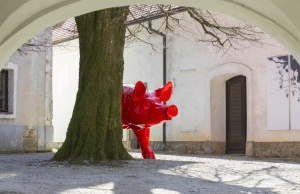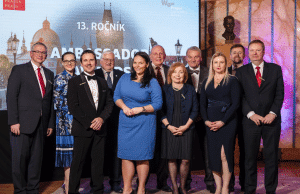A while ago I came across a tiny, narrow booklet with menus of one of the hotels in Ljubljana; judging from the design and typography, it was printed in the late sixties of the twentieth century. First in the booklet are “Slovenian national menus”, totalling five menus. Next on the menu are three “Yugoslavian national menus”, then “Hunting”, “Fishing”, “Menus with international dishes” (these represent the majority), “Diet menus”, “Vegetarian menus”, “Wedding menus” and finally “French cocktail for receptions”. Leaving the obvious cultural stereotypes, inventing something light years away from anything originally “national”, and many other details aside, the following is especially surprizing: the so-called “Slovenian national menus” that are introduced in the beginning of the hotel menus, are greater in number and, after all, are set apart from the “Yugoslavian national menus”. All this happened in a time when singular national cuisines standing out in socialist Yugoslavia was not very positively received. The booklet most certainly served the purpose of marketing the hotel. It was the starting point of this author’s contribution in this issue of the Kongres magazine, with which I want to call attention to the important ingredients of, true, incorrectly named, national dishes in the culinary selection in our hotels.
First a few words about this so-called national cuisine. This term is of course a question of the past. Today, we talk about domestic, local, and regional dishes because it is not only the EU, but rather the whole world, that is directed towards evaluating the palate of specialities that can be determined based on their geographical origin and therefore have their own logics and stories in certain environments. In other words: food helps shape and define these areas. This is why only frustrated countries still call their dishes national and Slovenia is definitely one of those countries. The big problem with including our domestic, local, and regional dishes in the culinary selection of our hotels is because of two major facts. First, that the heads of the culinary activity in these hotels are not familiar with these dishes or have stereotypical conceptions about them going back to their hospitality school days. For this reason they do not know how to present these dishes to the guests. A few weeks ago, I was in Maribor, the future Capital of Culture, and I asked the waiter in one of the hotels if they served “Pohorje hotpot” (to tell the truth, the question was quite thoughtfully selected!); he answered: “Do you mean goulash?” And the second fact: there are more and more foreign guests in Slovenia, eagerly waiting to discover, get to know, and taste something to exceed their expectations of this land of Slovenia, spoken of only with superlatives or at least to a certain degree. Especially congress activities, which this magazine talks in detail about, often does not take full advantage of the domestic, local, and regional treasures of individual cuisines that may be included in one or two dinners or lunches, but the problem often arises at coffee breaks, different receptions, and the general selection of these dishes in the actual hotels. Our hotels need to realize that menus should include a separate page with a list of these dishes and the same goes for wine lists: Slovenian wines should be consistently listed separately. If we can have wine lists with alcohol percentages, geographical origin, and of course the wine producer, than we can also have menus that say where the flower for the steamed dumplings (žlikrofi) came from, what farm produced the cabbage, etc. I was mortified to hear one of the best chefs in Slovenia tell me that he was leaving a hotel because the hotel management does not see eye to eye with his persistent respect and following the origin of the ingredients. After all: those average guests from Slovenia and abroad who have not even mastered the basic etiquette of dining really do not require more than the famous bags of frozen vegetables and similar five-star ingredients in our healthy country this side of the Alps. Or maybe not: in the long run such a strategy will blow up in our faces, which may be suggested by some innovative individual for the Snovalec Prize or maybe he will suggest setting up another adrenalin park deep under the snow’s surface(!). The hotels here that host numerous congresses will have to change their views, not to mention their strategies.
I have seen with my own eyes guests putting food from the breakfast buffet into their coolers so that they can survive until dinner. Guests of congresses require additional emphasizing in menus, like days and special attractions, connected to local dishes (something that every average road-side restaurant in Austria is well aware of); hotels will have to develop their referential dishes and not have the waiters say: “Everything is good here!” Only a few catering companies (fewer than I can count on one hand) understand the philosophy of difference for service also at breaks or receptions for congress participants. These are most often “bullied” with cured ham and sparkling wine, because we are not aware of excellent regional culinary salutes, which we incorrectly call welcomes anyway. There is another overlooked option I would like to mention with the wish of rectifying the situation as soon as possible. These are the programs during and after the congresses, best filled by different culinary tours and sampling trips. Let us enable the congress participants to experience what we like to emphasize: that Slovenia is healthy, natural, sustainable, bio, and who knows what else. Once we position congress guests among “the people”, once we enable them to simply get to know the everyday life and festivals of the inhabitants, the people of Slovenia, through food, drink, nature, the fruits it bears, and the environments in which the economic endeavours of our people take place, then I am sure that our success will be complete, because the satisfaction of our congress guests will be complete. The hotels in Slovenia have to be more open, they have to break out from the culinary spasm, the often impossible service and provincialism (said mildly!) of the people in charge who sometimes even forbid the receptionists to give the congress and other guests information on typical domestic, local, and regional dishes that they could try outside the hotel, because they have waited in vain for them there.
Prof. Janez Bogataj, PhD













